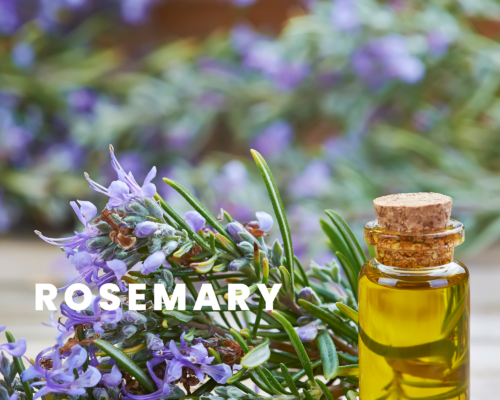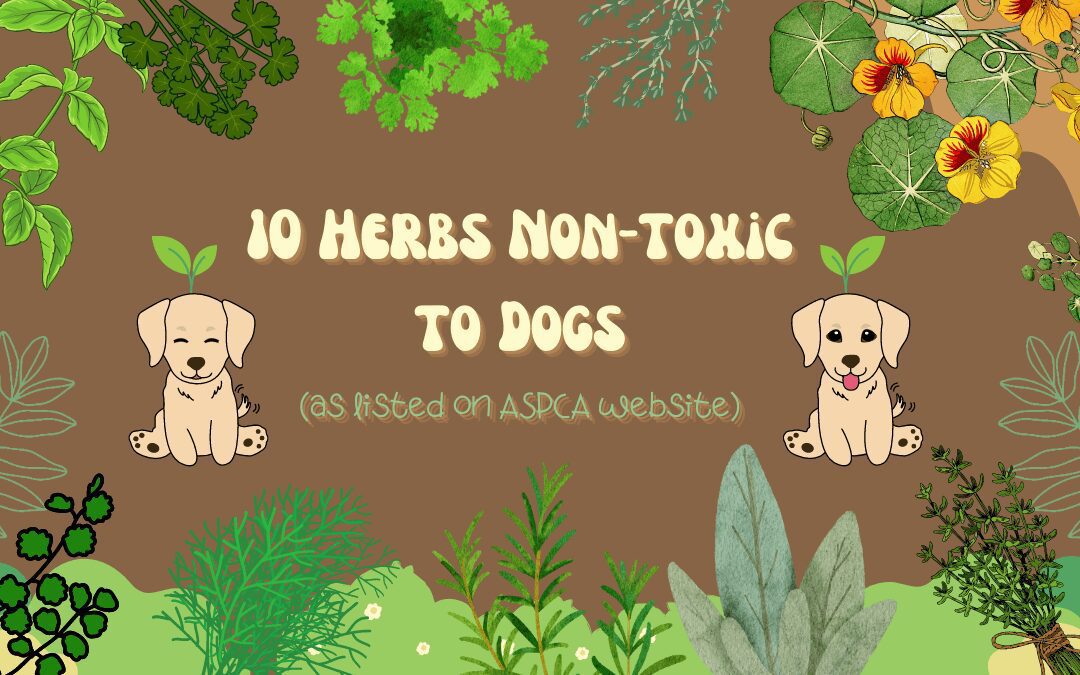The American Society for the Prevention of Cruelty to Animals (ASPCA) has compiled a list of plants that are deemed non toxic if dogs were to consume. I’ve pulled out 10 herbs from the list and am highlighting their flavors and a few uses for each.
Spring is a great time to plant both annual and perennial herbs; the fact that these are non toxic to dogs, is an added bonus! As long as there is no woofing these herbs down in a massive amount, if Biscuit decides to nibble the following 10 dog-friendly herbs, it shouldn’t be that big of a deal (minus a few leaves, of course).


Basil is a fragrant herb with a sweet and slightly peppery taste, that puts the pop in pesto. Basil waits until the cold temperatures have really dissipated before it starts to take off growing. It loves warm temperatures, so when summer is blazing, basil might be an herb that your dog tries grazing.
Crush the leaves of Lemon balm between your fingers and you’ll be treated to an enticing, citrusy aroma. It definitely smells like its name suggests and tastes like lemon as well, but what I love about Lemon Balm is that it won’t make you pucker. Sprinkle in salads for a hint of lemon. The flavor is delicious but mild.
A must when pickling cucumbers, Dill has a fresh, tangy, and grassy flavor that pairs well with fish and vegetables. It’s delicious in Mediterranean-inspired dishes. While it is on the non-toxic plant list for dogs, dill is also a host plant for the Black Swallowtail butterfly so you might find yourself shooing Rufus away from the tiny, hard-to-see butterfly eggs that may end up on your plant


Salad burnet has a light and refreshing flavor that adds a cucumber-like taste to salads. Use this one as it grows. The young foliage is tender and sweeter while the older fronds tend to get tough and bitter.
Nasturtium has a slightly spicy taste that brightens up salads with a peppery flair. You can eat the vibrantly- hued flowers. What fun! It’s doubtful that your dog would even want to eat your nasturtiums due to their peppery power, but if it does… will a sneeze spring from its snout? Inquiring minds want to know.
Savory has two varieties and two different seasons to grow them in, but according to the ASPCA, they are both on the non toxic plant list for dogs.
- Summer savory has a bold and peppery flavor that compliments beans, meats, and vegetables. It’s like having a 3-in-1 herb because it kind of tastes like a combo of mint, marjoram and thyme.
- Winter savory is similar to the taste of Summer Savory, but its flavor notes are somewhat deeper and earthier. These notes make winter Savory great for seasoning stews and roasts. If you’re like me, you know it’s really hard to resist the pleading look and soft round eyes of a dog as they wait for a morsel of meat. They’ve been smelling that stew all day; go ahead and toss them a bite, what are you, heartless?


Chervil has a delicate flavor that is perfect for soups and sauces (most commonly recognized in Béarnaise Sauce). While compared in flavor to a handful of herbs like: fennel, parsley, and tarragon, chervil has a much milder flavor than all of them. Maybe this is why it is nicknamed the ‘happy herb’.
Thyme has a minty and lemony taste that enhances the flavors of soups, stews, and roasted meats. Thyme’s diminutive size makes it easy to pop in any open space in the garden. It also can be quite resilient, if perhaps a dog’s paws walk across it from thyme to thyme.
Rosemary has a piney and earthy taste that is great for roasted meats and vegetables. While I love it in cooked dishes, one of my favorite ways to enjoy rosemary is steeped in filtered water overnight with a few orange slices. Refreshing and delicious on a hot summer day.


According to the ASPCA, all of these herbs are on the non-toxic list for dogs, so enjoy them in your pots and garden plots that your furry friends visit. Of course, I must now always add a disclaimer because we have no way of knowing the habits or the inner workings of your four-footed friends, and because I’m bound to hear how one of these made someone’s dog sick.
It always MUST be acknowledged that every pet is different, and just because a plant is considered dog-friendly, that doesn’t mean that over consumption of it won’t cause gastrointestinal distress. We are not encouraging you to feed a bowl of these herbs to your dog. We are only offering hope that if you like these herbs and wish to plant them in your landscape or in pots where your dog roams, most likely, your mutt will be okay. When in doubt, you should always keep in mind the habits of your particular pooch and double check with your personal veterinarian for their take on dog-friendly herbs if you have any concerns or questions.


I is voted tree poison to dogs?
Hi Mary,
I am not sure what plant you are referring to, but I would take a look at the links in this blog for ASPCA, as they have several lists, including toxic and non-toxic, lists for animals.